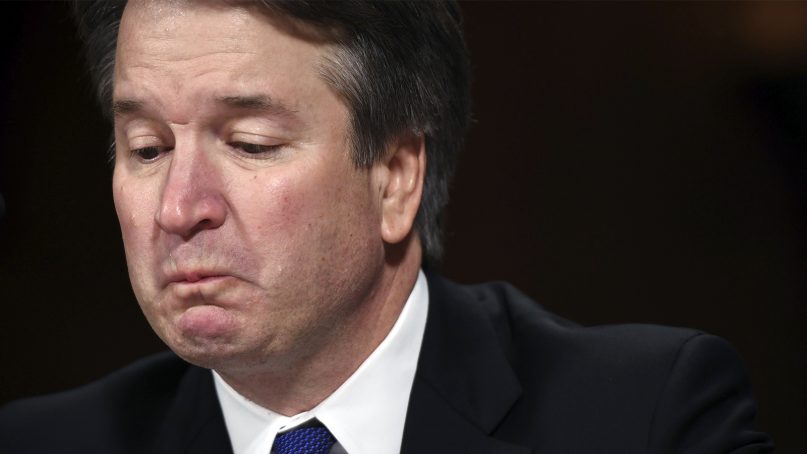(RNS) — There was a fair amount of God talk at the Senate Judiciary Committee hearing, though only in the afternoon, when Brett Kavanaugh (Catholic) testified. He let the senators know that he thanks God every day for his wife and family. He swore that he was innocent “under oath, before the Senate and the nation; before my family and God.”
We also got to hear how his 10-year-old daughter (“little Liza”) proposed the the family pray for “the woman”—accuser Catherine Blasey Ford. And to hear Kavanaugh declare that his detailed 1982 calendars made no mention of going to church because “for me, going to church on Sundays was like brushing my teeth, automatic.” And, presumably, no less prophylactic.
But the best was left for the day’s final questioner, Sen. John Neely Kennedy (Methodist) of Louisiana. “Do you believe in God,” he queried. “I do,” replied the judge. Whereupon Kennedy proceeded to afford the witness “a last opportunity, right here, right in front of God and country. I want you to look me in the eye.”
KENNEDY: None of these allegations are true?
KAVANAUGH: Correct.
KENNEDY: No doubt in your mind?
KAVANAUGH: Zero, I’m 100 percent certain.
KENNEDY: Not even a scintilla?
KAVANAUGH: Not a scintilla; 100 percent certain, senator.
KENNEDY: You swear to God?
KAVANAUGH: I swear to God.
But now that Sen. Jeff Flake (Mormon) has gotten the final vote put off by forcing Mitch McConnell (Baptist) and Donald Trump (whatever) to let the FBI investigate the allegations, let’s take a look at a more reflective exercise in religious persuasion, Thursday’s editorial in America, the venerable magazine of the selfsame Jesuits that run Brett Kavanaugh’s alma mater, Georgetown Prep.
The editors, who had previously endorsed Kavanaugh’s appointment on pro-life grounds, point out that if the question before the Senate were Kavanaugh’s legal or moral responsibility for the alleged assault on Dr. Blasey, then “more stringent” standards of proof would apply.
But the question is not solely about Judge Kavanaugh’s responsibility, nor is it any longer primarily about his qualifications. Rather it is about the prudence of his nomination and potential confirmation. In addition to being a fight over policy issues, which it already was, his nomination has also become a referendum on how to address allegations of sexual assault.
Like it or not, the Judiciary Committee’s hearings and deliberations have become “a bellwether of the way the country treats women when their reports of harassment, assault and abuse threaten to derail the careers of powerful men.”
Prudence, according to the Catechism of the Catholic Church, “is the virtue that disposes practical reason to discern our true good in every circumstance and to choose the right means of achieving it.” Exercising their prudential judgment, the editors reached the conclusion that “[t]he best of the bad resolutions available in this dilemma is for Judge Kavanaugh’s nomination to be withdrawn.”
As they wait for the FBI to deliver the results of its investigation, it would be good if the President and the Republican members of the world’s greatest deliberative body take this judgment to heart.






